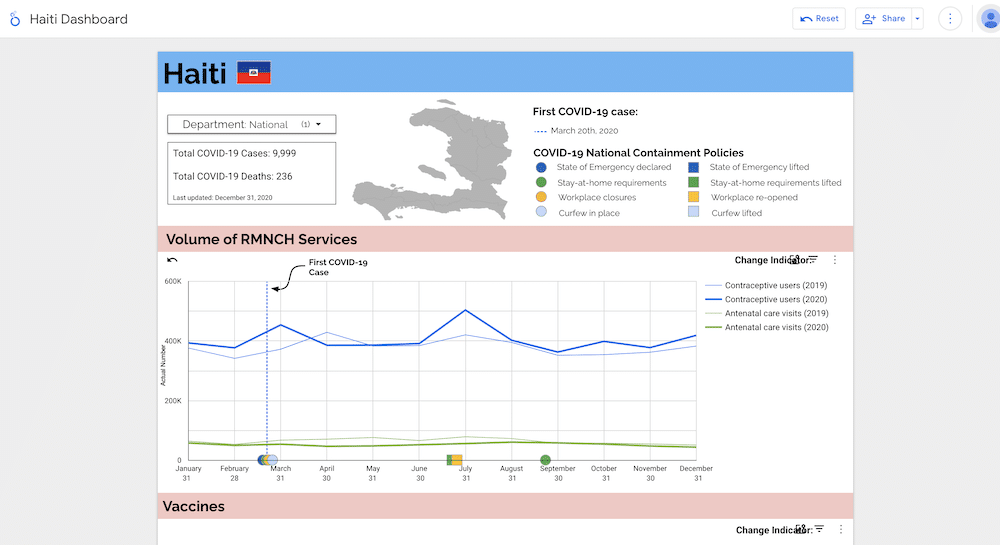To measure the effect of the COVID-19 pandemic and associated containment policies such as curfews on health care in seven countries by using health management information systems to evaluate the quality of care and mortality rates from non-COVID conditions.
To measure the effect of the COVID-19 pandemic and associated containment policies such as curfews on health care in seven countries by using health management information systems to evaluate the quality of care and mortality rates from non-COVID conditions.
Catherine Arsenault at the Harvard T.H. Chan School of Public Health in the U.S. and colleagues aimed to measure the effect of the COVID-19 pandemic and associated containment policies such as curfews on the quality of health care in seven countries and the rates of mortality from non-COVID conditions. They have extracted data from health management information systems spanning two years from Ethiopia, Ghana, Haiti, Laos, Mexico, Nepal, and South Africa. They cleaned the data and then applied an analytical tool called segmented regression analysis to assess the effect of the pandemic on health service delivery, such as the provision of certain preventive and curative services, and used a statistical technique called difference-in-differences estimations to assess the effect of containment policies on healthcare demand, such as patient appointments. This will help countries to address gaps in their health care systems and plan recovery strategies for missed health care.
| Title | Journal | Date |
Type | Abstract |
|---|---|---|---|---|
|
|
PLOS Global Public Health |
Sept 2o22 | Publication | The spread of COVID-19 and associated deaths have remained low in Ethiopia. However, the pandemic could pose a public health crisis indirectly through disruptions in essential health services… |
| Overcoming disruptions in essential health services during the COVID-19 pandemic in Mexico
|
BMJ Global Health |
Mar 2022 | Publication | Significant disruptions in health services during the first year of the COVID-19 pandemic prompted the Mexican Institute of Social Security (IMSS) to implement the National Strategy for Health Services Recovery (NHSR strategy) to ensure resumption of essential health services provided to almost 68 million IMSS affiliates… |
|
COVID-19 and resilience of healthcare systems in ten countries
|
Nature Medicine |
Mar 2022 | Publication | Declines in health service use during the Coronavirus Disease 2019 (COVID-19) pandemic could have important effects on population health. In this study, we used an interrupted time series design to assess the immediate effect of the pandemic on 31 health services… |
| Disruption in essential health services in Mexico during COVID-19: an interrupted time series analysis of health information system data | BMJ Global Health | Aug 2021 | Publication | The COVID-19 pandemic has disrupted health systems around the world. The objectives of this study are to estimate the overall effect of the pandemic on essential health service use and outcomes in Mexico, describe observed and predicted trends in services over 24 months, and to estimate the number of visits lost through December 2020 |
| Title | Type | Description |
| dhis2 service delivery/mortality indicators KwaZulu-Natal, South Africa 2019/20 | Metadata | This dataset contains a series of service delivery and institutional mortality indicators from the South African dhis2 for the period of January 2019 to December 2020. This monthly dataset includes 15 months pre-COVID and 9 months during the pandemic. |
| dhis2 service delivery/mortality indicators Lao 2019/20 | Metadata | This dataset contains a series of service delivery and institutional mortality indicators from the Lao People’s Democratic Republic dhis2 for the period of January 2019 to December 2020. This monthly dataset includes 15 months pre-COVID and 9 months during the pandemic. |
| dhis2 service delivery/mortality indicators Ethiopian 2019/20 | Metadata | This dataset contains a series of service delivery and institutional mortality indicators from the Ethiopian dhis2 for the period of January 2019 to December 2020. This monthly dataset includes 15 months pre-COVID and 9 months during the pandemic. |
| dhis2 service delivery/mortality indicators Mexico 2019/20 | Metadata | This dataset contains a series of service delivery and institutional mortality indicators from the Mexican Institute for Social Security (IMSS) health information system for the period of January 2019 to December 2020. This monthly dataset includes 15 months pre-COVID and 9 months during the pandemic. |
| dhis2 service delivery/mortality indicators Haiti 2019/20 | Metadata | This dataset contains a series of service delivery and institutional mortality indicators from the Haiti dhis2 for the period of January 2019 to December 2020. This monthly dataset includes 15 months pre-COVID and 9 months during the pandemic. |
| dhis2 service delivery/mortality indicators Ghana 2019/20 | Metadata | This dataset contains a series of service delivery and institutional mortality indicators from the Ghana dhis2 for the period of January 2019 to December 2020. This monthly dataset includes 15 months pre-COVID and 9 months during the pandemic. |
| dhis2 service delivery/mortality indicators Nepal 2019/20 | Metadata | This dataset contains a series of service delivery and institutional mortality indicators from the Nepal dhis2 for the period of January 2019 to December 2020. This monthly dataset includes 15 months pre-COVID and 9 months during the pandemic. |
| HS-performance-during-covid-stata-do-files | Github code | This repository contains STATA do-files and R scripts used to recode, clean and analyse dhis2 and HMIS data for the project: Health System Resilience during Covid-19: Impact of COVID-19 on Health Service Delivery and Institutional Mortality: A Multi Country Consortium |
| Title |
Description |
|
| Haiti Dashboard |
The dashboard prepared during the REHCORD study was presented to stakeholders at the Ministry of Public Health and Population to raise awareness of the decline in service use during the COVID-19 pandemic |

|
To measure the effect of the COVID-19 pandemic and associated containment policies such as curfews on health care in seven countries by using health management information systems to evaluate the quality of care and mortality rates from non-COVID conditions
Video transcription
So the main goals of our project are first and foremost to estimate the impact of the pandemic on healthcare utilisation on quality of care and on non COVID mortality. A second aim is to develop methods for cleaning these data and to in general share experience working with health management information systems.
In terms of data we are working with 10 country partners, and we are using data from health information systems. In six countries the data are coming directly from the DHS to platform and in four other countries, we’ve extracted the data from various administrative sources. These data relate to the volume of health services that have been provided by health facilities before and during the pandemic and on the number of deaths from non COVID conditions.
In terms of impact, we’re hoping that our project will be helpful in designing strategies for compensating for missed healthcare during the pandemic. Also for planning for future health system investments, and also to make health systems better prepared to face the next pandemic or the next crisis.
Our results should be available very shortly. Our first multi-country paper is already under review and it looked at the impact of the pandemic on healthcare utilisation in 10 countries.
One priority for the field of health data science right now, in my opinion is to expand the use of routine health information system data for both research and for policymaking. I think it is urgent to start making better use of the existing data system


